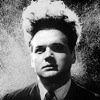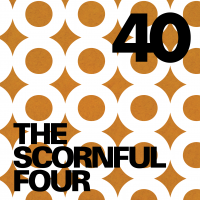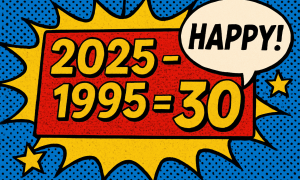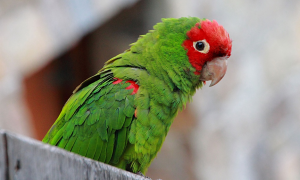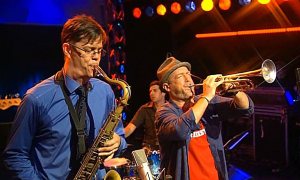Home » Jazz Articles » Genius Guide to Jazz » A Mingus Among Us
A Mingus Among Us
The Jazz Workshop also produced fine hand-crafted, jazz-themed spice racks and birdhouses to supplement their income and raise awareness about jazz throughout the burgeoning suburbia of Eisenhower-era America.
 If you were to sit down and make a list of jazz's greatest bassists/composers/bandleaders of all time, you wouldn't get very far at all because it is almost time for dinner and you still have this article to read yet. But as short as that list would be, it would certainly include Charles Mingus. In fact, with the criteria I've given you, it is possible that Charles Mingus would be the only name on the list. Had I widened the description to include bassist/composer/bandleader/shortstop, you could make a case for the great Honus Wagner, who never played jazz in his life but man could he turn a double play.
If you were to sit down and make a list of jazz's greatest bassists/composers/bandleaders of all time, you wouldn't get very far at all because it is almost time for dinner and you still have this article to read yet. But as short as that list would be, it would certainly include Charles Mingus. In fact, with the criteria I've given you, it is possible that Charles Mingus would be the only name on the list. Had I widened the description to include bassist/composer/bandleader/shortstop, you could make a case for the great Honus Wagner, who never played jazz in his life but man could he turn a double play.6-4-3. Two out, top of the first.
Charles Earl Mingus (I couldn't find any record of his middle name, so I lent him mine) was born in Nogales, Arizona, on April 22, 1922. Even as a newborn Mingus knew that the Nogales jazz scene consisted entirely of a guy who had once felt up Bessie Smith at a cotillion, so he persuaded his father to move the family to somewhere more jazz-oriented. Many jazz scholars now believe that young Mingus was actually trying to get the family to New York, the hottest spot for jazz at the time with the possible exception of Chicago. But in one of those great moments of happenstance that are legendary in jazz history, when his father asked him where he wanted to move, his off-guard reply "What?" was interpreted as "Watts." The family ended up in Los Angeles.
So then.
Before Mingus was 2, his mother passed away. His father remarried, and his stern but loving stepmother forbade any music in the house except church music. She also forbade any food in the house but church food, so Mingus' formative years were spent eating nothing but bread and wine. This was only because Mingus' father was a member of the traditional African Methodist Episcopal Church. Had his stepmother, a member of the evangelical Holiness church, had her way, it would have been crackers and grape juice. Later, she was persuaded to allow food one would find at a church covered dish supper, but upon tasting that horrid green bean casserole that always seems to show up at such events, Mingus went back to bread.
Chastened by his experience with the casserole, Mingus was somewhat reluctant to experience anything else beyond his limited realm. However, while experimenting with his father's radio, he wandered across Duke Ellington's "East St. Louis Toodle-Oo". Unlike anything he had ever heard, the dark and seductive sound enchanted him. He even gave the green bean casserole another shot, this time while listening to Ellington's "Black and Tan Fantasy". The casserole still sucked, but Mingus was hooked on the exotic sound that was called in less-enlightened times "jungle music." Of course, we know it is now called jazz, or else this would be allaboutjunglemusic.com and I would have been spared years of morons calling me Jazzy Jeff. Junglemusic Jeff is just too many syllables for the average dumbass to come up with on his own.
Anyway.
 Mingus demonstrated an early proclivity for music, first taking up the trombone but having an innate foreknowledge that I would someday also play the trombone and wishing to avoid the whole Mingus-Genius nonsense that would sprout from slackwitted journalists trying to explain away the both of us. Switching instead to double bass (not to be confused with a double play, mentioned earlier for no good reason), he studied under the principal bassist for the New York Philharmonic for five years before finally deciding that the bass possessed enough magnetism to attract the ladies. Just to be safe, though, he also studied piano and sharpened his composition skills. You can never be too careful.
Mingus demonstrated an early proclivity for music, first taking up the trombone but having an innate foreknowledge that I would someday also play the trombone and wishing to avoid the whole Mingus-Genius nonsense that would sprout from slackwitted journalists trying to explain away the both of us. Switching instead to double bass (not to be confused with a double play, mentioned earlier for no good reason), he studied under the principal bassist for the New York Philharmonic for five years before finally deciding that the bass possessed enough magnetism to attract the ladies. Just to be safe, though, he also studied piano and sharpened his composition skills. You can never be too careful.
By the early forties, Mingus was playing with such famous big bands as those of Louis Armstrong , Kid Ory and Lionel Hampton. But Mingus was quickly becoming too much of a force in his own right to be buried behind row upon row of musical automatons dutifully playing the homogenized charts meted out for public consumption during the Big Band Era. Mingus was also proving himself to be a capable and charismatic leader of men, a trait which would serve him later as bandleader, organizer of the famous Jazz Workshop, and Scoutmaster of Boy Scout Troop 146.
By the 1950's, Mingus found himself in New York (or rather, a private detective he had hired to find himself had found him there. Self-discovery was handled a bit differently in those days). He quickly found himself in demand as a bassist, working with many of the top musicians of the day. Charlie Parker, Miles Davis, Art Tatum, and Bud Powell not only employed Mingus as a bassist, but used the rangy virtuoso as a power forward on the BeBop School's basketball team.
Having established himself a legitimate force as a performer, Mingus began to branch out into other facets of the music business. Forming his own publishing and recording companies to take control of the money end of the creative process, he also created the famed Jazz Workshop to both teach young musicians and give fledgling composers an outlet to have their work performed. The Jazz Workshop also produced fine hand-crafted, jazz-themed spice racks and birdhouses to supplement their income and raise awareness about jazz throughout the burgeoning suburbia of Eisenhower-era America.
Or maybe they didn't.
The sixties began badly for Mingus. Volumes have been written about the disastrous 1962 Town Hall concert. Although, the ruinous performance is typically spoken of as though everyone already knows exactly what transpired that fateful night at New York's legendary venue. "What a shame that was, the disastrous 1962 Town Hall concert." the serious jazz writers say, rubbing their chins thoughtfully and nodding their agreement that the Town Hall concert in 1962 was indeed disastrous.
Which is why sensible people like you read the Genius Guide.
Feeling his oats after his many successes, Mingus decided to take a big band onstage and record it live. This, in and of itself, was no problem. The difficulty arose from the fact that Mingus wanted the same sort of loose experimentation that he was able to harness with the Jazz Workshop. It was a volatile mix, the mercurial temperament of Mingus combined with the pressure placed on his hand-picked musicians and arrangers, exacerbated by ever-changing deadlines and personnel, topped off by the fact that everyone involved (Mingus included) was being asked for more than may have even been possible at that time.
 My father was a motorcar mechanic for the C&O Railroad for thirty years. Often, he would be dispatched in the middle of the night to some godawful remote spot to make vital on-site repairs to equipment that had been damaged by a derailment or other mishap. In his days, he saw some of the most incredible train wrecks on the East Coast. He knew nothing about jazz whatsoever, but he would have appreciated the Town Hall Concert for what it was.
My father was a motorcar mechanic for the C&O Railroad for thirty years. Often, he would be dispatched in the middle of the night to some godawful remote spot to make vital on-site repairs to equipment that had been damaged by a derailment or other mishap. In his days, he saw some of the most incredible train wrecks on the East Coast. He knew nothing about jazz whatsoever, but he would have appreciated the Town Hall Concert for what it was.
Ill-prepared, under significant duress, lacking unity of vision, and overwhelmed by every aspect of the performance, the usually reliable collection of professional musicians found themselves unable to conform to Mingus' exacting vision of what he wanted the gig to be. For his part, Mingus had almost certainly overextended himself with the ambitious project. He wanted it to be his grand statement, his magnum opus, and when it failed to conform he was unable to readjust his expectations. As it became obvious that the show was going down in flames, Mingus fanned the inferno with his caustic remarks and obviously uncontrollable emotions. Joe Glaser, whom you may remember as Louis Armstrong's mobbed-up agent, was also one of the promoters of the concert. He went onstage to offer the audience their money back, an offer they could not refuse.
I immediately apologize for that gag.
A lesser man would have been destroyed by the spectacular failure at Town Hall, or at least chastened to a meeker self. Not Mingus. Though he never again repeated the mistakes that led to his conspicuous failure, he did not compromise one single ounce of his forceful and visionary personality. Controversial and confrontational, he did not shy away from including political and social commentary in his work. Original Faubus Fables, a scathing assault on Arkansas' segregationist governor Orville Faubus, remains one of Mingus' most significant musical statements. Faubus' musical reply, Who the Heck is this Mingus Feller Anyhow? (Suite for Redneck and Banjo) was relegated to well-deserved obscurity until it was mentioned just now and even then, only as a ham-fisted comic device.
 With his reputation and place in jazz firmly secured, Mingus could have sat back and rested on his laurels. In fact, those closest to him claim that he had the most comfortable laurels they had ever seen, and in fact friends occasionally borrowed them to use as a guest bed whenever they had company. These were the days before futons were commonplace. Mingus, of course, did not invent the futon; but he did write an instruction manual for toilet training a cat. That is the single most unusual thing I came across in my research for this piece, and had to work it in somewhere. This seemed as good a time as any.
With his reputation and place in jazz firmly secured, Mingus could have sat back and rested on his laurels. In fact, those closest to him claim that he had the most comfortable laurels they had ever seen, and in fact friends occasionally borrowed them to use as a guest bed whenever they had company. These were the days before futons were commonplace. Mingus, of course, did not invent the futon; but he did write an instruction manual for toilet training a cat. That is the single most unusual thing I came across in my research for this piece, and had to work it in somewhere. This seemed as good a time as any.
So then.
 Mingus remained a productive artist almost to the very end. He spent much of the seventies touring all over the world, and his compositions were used by ballet companies such as the Joffrey Ballet (with choreography by Alvin Ailey, of Alvin and the Chipmunks fame. Or not). In 1977, however, Mingus was diagnosed with amyotrophic lateral sclerosis, commonly known as Lou Gehrig's Disease. In early 1979, Mingus died while in Mexico at the age of 56. And the second most unusual thing I came across in my research for this piece was the fact that on the day Mingus died, 56 whales beached themselves in Mexico. This fact would have been even cooler if the whales had've had the forethought to spell out "Goodbye Mingus" as their last act. I worked the logistics, and it would take exactly 56 whales to spell that out (including one to dot the I). But we'll take what we can get.
Mingus remained a productive artist almost to the very end. He spent much of the seventies touring all over the world, and his compositions were used by ballet companies such as the Joffrey Ballet (with choreography by Alvin Ailey, of Alvin and the Chipmunks fame. Or not). In 1977, however, Mingus was diagnosed with amyotrophic lateral sclerosis, commonly known as Lou Gehrig's Disease. In early 1979, Mingus died while in Mexico at the age of 56. And the second most unusual thing I came across in my research for this piece was the fact that on the day Mingus died, 56 whales beached themselves in Mexico. This fact would have been even cooler if the whales had've had the forethought to spell out "Goodbye Mingus" as their last act. I worked the logistics, and it would take exactly 56 whales to spell that out (including one to dot the I). But we'll take what we can get.
Like Miles Davis, Mingus volatile personality often overshadowed his musical accomplishments. For each of the great contributions he made to jazz, there is a story about the time he punched so-and-so in the face or tried to slam the piano lid down on some unwitting keyboardist's fingers. Still, Mingus must be remembered today for his intense love of jazz, even if he wasn't always fond of certain jazz musicians. His compositions respectfully encompassed all that jazz had been and fearlessly predicted what it could be, his playing redefined all expectations of what the bass was capable of, and his toilet training manual for cats is a far sillier coda for this piece than anything I could have made up.
Till next month, kids, exit to your right and enjoy the rest of AAJ.
Tags
PREVIOUS / NEXT
Support All About Jazz
 All About Jazz has been a pillar of jazz since 1995, championing it as an art form and, more importantly, supporting the musicians who make it. Our enduring commitment has made "AAJ" one of the most culturally important websites of its kind, read by hundreds of thousands of fans, musicians and industry figures every month.
All About Jazz has been a pillar of jazz since 1995, championing it as an art form and, more importantly, supporting the musicians who make it. Our enduring commitment has made "AAJ" one of the most culturally important websites of its kind, read by hundreds of thousands of fans, musicians and industry figures every month.

